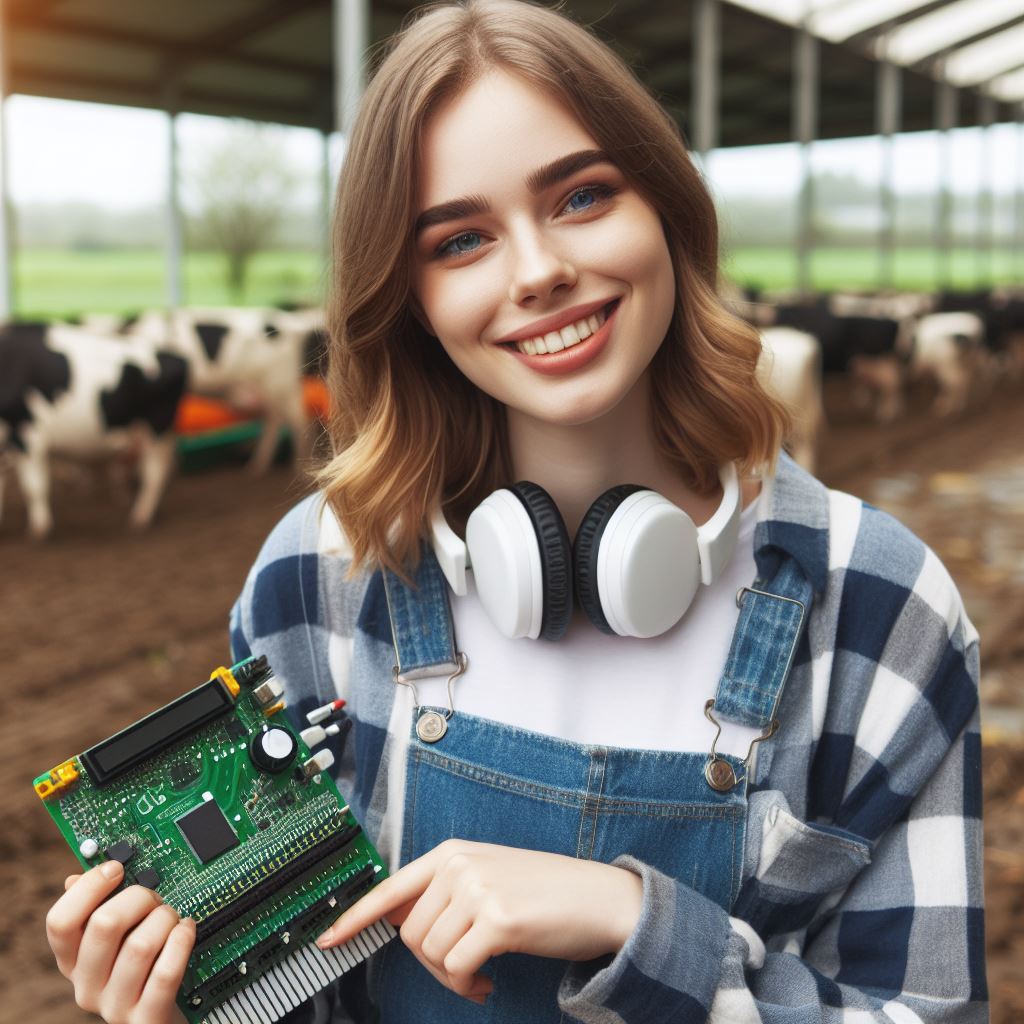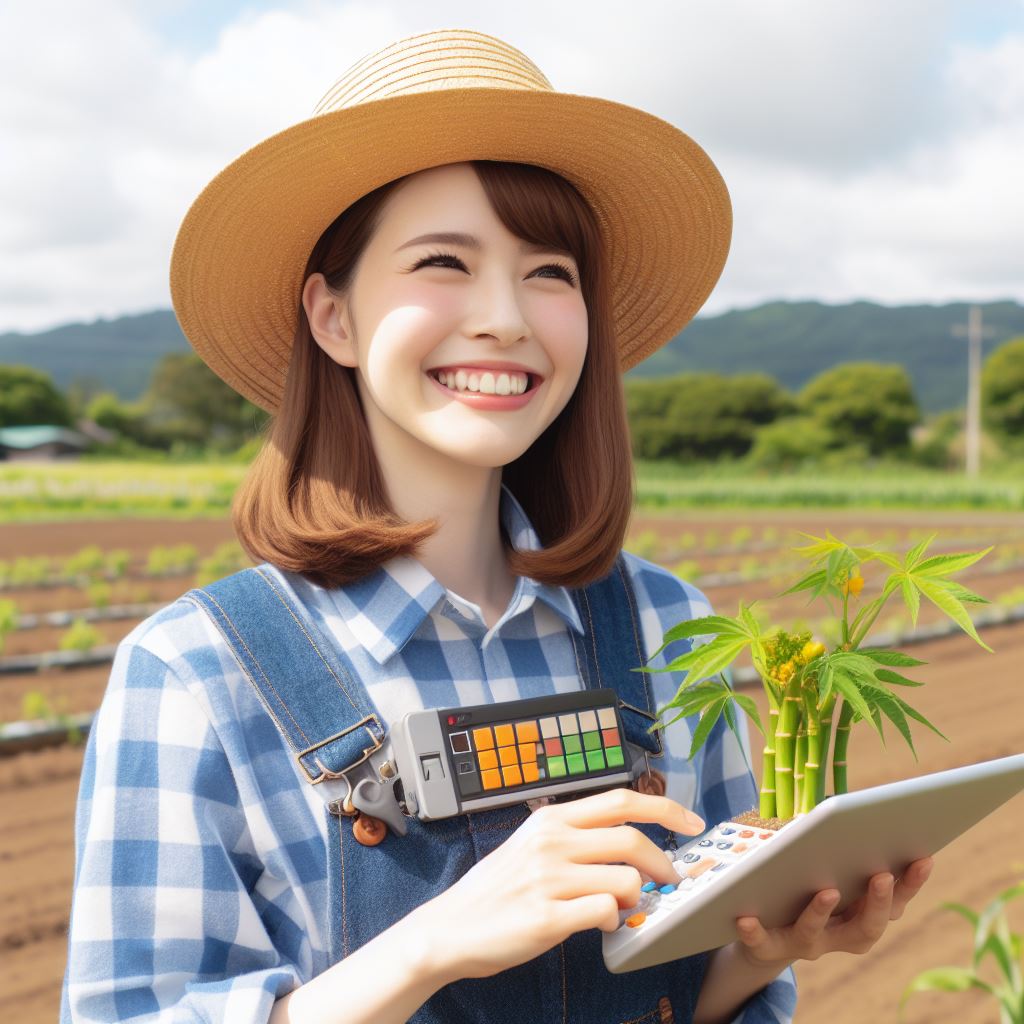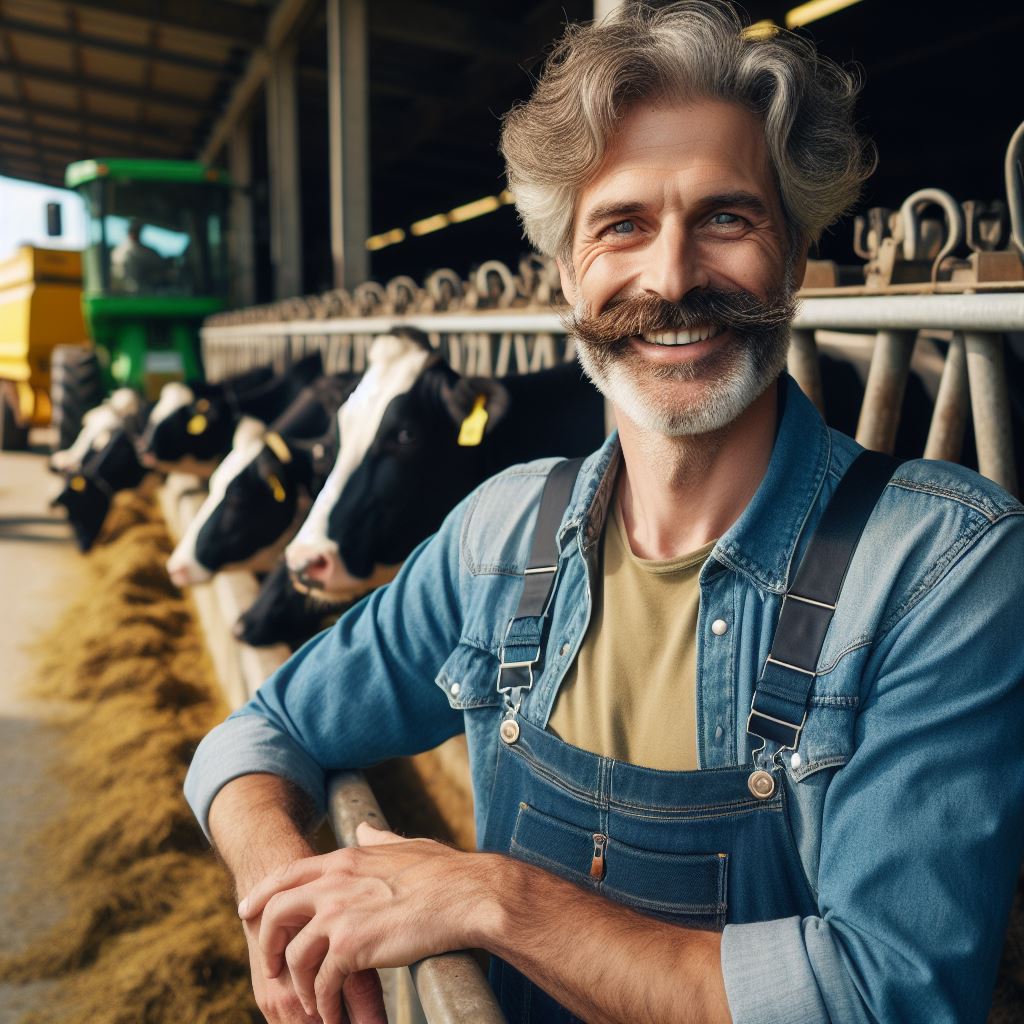Introduction
In this blog post, we will explore the surprising transition from the world of IT to the realm of farming.
Transition from IT to farming
It may come as a surprise to many, but there is a growing trend of professionals leaving the tech industry to pursue a career in farming.
Active Voice Blog Chapter
The fast-paced world of coding and problem-solving has attracted many talented individuals over the years.
However, some have begun to feel disconnected and unfulfilled in this digital landscape.
As a result, they have decided to trade in their computers for a pair of sturdy work boots.
The allure of farming lies in its tangible and hands-on nature. Instead of facing a glowing screen all day, these career changers now spend their time cultivating the earth, tending to crops, and caring for animals.
It is a refreshing change of pace that allows them to reconnect with nature and find satisfaction in physical labor.
But why the sudden shift from behind a desk to the great outdoors?
For many, it is a desire to lead a more sustainable and environmentally conscious lifestyle.
They see farming as an opportunity to make a positive impact on the planet, contributing to local food production and minimizing the carbon footprint associated with industrial agriculture.
Furthermore, farming offers a sense of self-sufficiency and independence that is often missing in the corporate world.
With their own land and resources, these former IT professionals can create their own livelihoods and take charge of their destiny.
In essence, the transition from IT to farming may seem like a drastic change, but for these individuals, it is a decision driven by a desire for a more meaningful and sustainable lifestyle.
By leaving the world of coding behind, they are able to reconnect with nature, make a positive impact on the environment, and find fulfillment in working the land.
First Impression of IT
When I first entered the world of IT, I was a fresh graduate with a degree in Computer Science.
I had a passion for technology and a curiosity to explore the vast opportunities that this field had to offer.
My initial experiences in the IT field were both challenging and exhilarating.
I was exposed to various projects that required problem-solving skills, critical thinking, and the ability to work under tight deadlines.
The fast-paced nature of the industry kept me on my toes, constantly learning and adapting to new technologies.
Skills gained in IT that are applicable to farming
Throughout my IT journey, I gained a wide range of skills that I never thought would be applicable to farming.
These skills included:
- Programming: As a software developer, I honed my coding skills and learned multiple programming languages. This logical thinking and ability to write efficient code would later prove to be valuable in farming automation and data analysis.
- Problem-solving: IT is all about finding solutions to complex problems. This mindset allowed me to approach farming challenges creatively, thinking outside the box and exploring innovative solutions.
- Analytical thinking: In the IT field, data analysis is crucial for decision-making. This skill helped me analyze farming data, such as crop yields and weather patterns, to optimize agricultural processes.
- Attention to detail: In software development, even the smallest error can cause significant issues. This attention to detail translated into meticulous farm management, ensuring that every aspect of the crops’ needs was met.
- Adaptability: IT constantly evolves, and professionals need to stay updated with the latest trends. This adaptability helped me embrace new farming techniques and technologies, enabling me to stay ahead in the agricultural industry.
Significant impacts of IT knowledge on farming
As I immersed myself deeper into the world of farming, I realized that my IT background provided me with a unique perspective.
I was able to leverage technology to improve efficiency, sustainability, and overall productivity on the farm.
One of the most significant impacts of my IT knowledge on farming was the automation of various tasks.
I developed custom software and utilized sensors to automate irrigation systems, monitor soil moisture levels, and control greenhouse environments.
These technological integrations not only saved time and labor but also optimized resource usage, minimizing water waste and maximizing crop yields.
Data analysis was another area where my IT skills shone in farming.
By collecting and analyzing data from various sources such as weather stations, soil sensors, and market trends, I could make data-driven decisions.
This allowed me to better manage irrigation schedules, adjust fertilizer usage, and time planting according to market demands.
Furthermore, my understanding of cybersecurity from the IT field provided me with the knowledge and expertise to protect the farm’s data integrity and implement measures against potential threats.
With the increasing digitalization of farming processes, this skill became crucial in safeguarding sensitive information.
In fact, my background in IT has proved to be invaluable in my journey from coding to cultivating.
The skills I gained in the IT field, such as programming, problem-solving, analytics, attention to detail, and adaptability, have seamlessly transferred to farming.
By merging technological advancements with traditional agricultural practices, I have been able to enhance productivity, resource efficiency, and sustainability on my farm.
Transform Your Agribusiness
Unlock your farm's potential with expert advice tailored to your needs. Get actionable steps that drive real results.
Get StartedRead: Urban Vineyards in Dallas: A Unique Tale
Discovering the Passion for Farming
How the author developed an interest in farming
- As a child, I spent summers on my grandparents’ farm, helping with chores and witnessing the beauty of nature.
- While working in IT, I began craving a connection with the land and a more meaningful way of life.
- After attending a farming conference, I was inspired by passionate individuals sharing their love for agriculture.
- I started reading books and researching farming techniques in my spare time, fueling my growing interest.
- Eventually, I took the leap and enrolled in agricultural courses to gain practical knowledge.
Specific aspects of farming that captured the author’s interest
- The ability to work outdoors and be in harmony with nature appealed to my longing for a simpler lifestyle.
- The idea of cultivating and nurturing the earth, watching plants grow from seed to harvest, filled me with excitement.
- Rearing animals, caring for their well-being, and understanding the food chain fascinated me.
- The prospect of contributing to local food production and fostering sustainable practices resonated deeply.
- Exploring the art of beekeeping to support pollination and honey production intrigued me.
The initial challenges faced when transitioning from IT to farming
- The lack of practical experience in farming made it challenging to apply acquired knowledge in real-life situations.
- Adjusting to the physical demands of farm work proved more strenuous than the sedentary nature of IT jobs.
- Managing finances and learning the economics of farming required a steep learning curve.
- Dealing with unpredictable weather patterns presented difficulties in planning and executing farming activities.
- Overcoming societal perceptions about career choices and explaining my unconventional shift to family and friends.
Read: Portland’s Pioneers: Innovating Urban Farm
Exploring the Similarities
The similarities between IT and farming
- Both IT and farming require a systematic approach and attention to detail.
- Both fields rely on problem-solving skills to overcome challenges and achieve desired outcomes.
- IT and farming depend on strategic thinking and planning to optimize productivity and efficiency.
- Both industries require continuous learning and staying updated with the latest advancements in technology.
- IT professionals and farmers need to adapt to changing circumstances and find innovative solutions to stay competitive.
How problem-solving skills from IT can be applied to farming:
Problem-solving skills acquired in the IT field can be directly applied to farming, bringing about positive changes:
- Data analysis: IT professionals are adept at analyzing large sets of data to identify patterns and make informed decisions. This skill can be used in farming to analyze crop yields, soil composition, and weather patterns to optimize agricultural practices.
- Automation: In IT, automation is utilized to streamline processes and eliminate human errors. Similarly, in farming, automation technologies can be used for tasks like irrigating fields, monitoring equipment, and managing livestock.
- Precision farming: IT professionals excel in developing and implementing precise and accurate solutions. This expertise can be leveraged in farming through precision agriculture techniques that use GPS, sensors, and drones to precisely apply fertilizers, pesticides, and water, reducing waste and increasing yields.
- Artificial Intelligence: The application of AI in IT has revolutionized various industries. Similarly, AI can be utilized in farming to analyze variables like soil quality and moisture content, enabling farmers to make informed decisions for better crop management.
- Communication and collaboration: IT professionals are skilled at working in teams and collaborating with stakeholders to achieve common goals. This skill is essential in farming as it involves working with suppliers, agricultural experts, and even consumers to ensure the success of the agricultural ecosystem.
Importance of technology in modern agriculture
Technology plays a crucial role in modern agriculture, transforming the industry in numerous ways:
- Increased productivity: Advanced machinery and equipment have significantly improved agricultural productivity, enabling farmers to cultivate larger areas and achieve higher yields.
- Efficient resource management: Technology helps optimize the use of resources such as water, fertilizers, and energy. Smart irrigation systems and precision application techniques minimize waste and reduce environmental impact.
- Monitoring and control: Sensors and real-time data analysis provide farmers with valuable insights into crop health, water availability, and pest infestations. This allows for proactive measures to prevent crop losses and efficiently manage resources.
- Market access: IT has facilitated better market access for farmers through online platforms and e-commerce. Farmers can connect directly with consumers, eliminating intermediaries and ensuring fair prices for their produce.
- Sustainability: Technology in agriculture promotes sustainable practices by reducing chemical usage, minimizing water consumption, and optimizing resource allocation. This helps conserve natural resources, protect the environment, and ensure long-term viability for the industry.
In short, the similarities between IT and farming highlight the transferability of problem-solving skills from one industry to another.
The integration of technology in agriculture has revolutionized the sector, enhancing productivity, resource management, and sustainability.
As technology continues to advance, the future of farming looks promising, with IT professionals contributing their expertise to create a more efficient and sustainable agricultural system.
Read: Dairy Dreams: 4 Generations of Care

Learning the Ropes
When I made the shift from coding to cultivating, I had to embark on a journey of acquiring knowledge and skills in farming.
Here is a breakdown of the process I went through:
- Research: I started by immersing myself in books, articles, and online resources to understand the basics of farming.
- Hands-on Experience: To truly learn, I spent time working on different farms, volunteering, and shadowing experienced farmers.
- Networking: Building connections with other farmers proved to be invaluable. I joined local farming communities and participated in workshops and meet-ups.
- Mentorship: Finding a mentor who could guide me through the intricacies of farming was crucial. I was fortunate to find an experienced farmer who took me under their wing.
Resources utilized for learning about farming techniques
Acquiring knowledge and skills in farming requires utilizing a variety of resources:
- Books and Publications: I devoured books on various farming techniques, crop management, and organic farming practices.
- Online Courses: I enrolled in online courses that offered in-depth knowledge on specific aspects of farming, such as soil health and sustainable agriculture.
- Workshops and Seminars: Attending workshops and seminars allowed me to learn from experts in the field and gain insights into the latest farming trends and practices.
- Government Resources: I made use of government websites and agricultural extension programs to access information on grants, subsidies, and regulations related to farming.
Certifications or courses taken by the author to enhance farming skills
Continuous learning and improvement are essential in any profession, and farming is no exception.
In my journey, I pursued certifications and courses to enhance my farming skills:
- Organic Farming Certification: I completed a rigorous certification program in organic farming to understand the principles and practices of sustainable agriculture.
- Permaculture Design Course: This course taught me how to design and create sustainable and self-sufficient farming systems.
- Crop Rotation and Soil Management Workshop: I attended a workshop that focused on crop rotation techniques and effective soil management strategies.
- Farm Business Management Course: To understand the financial aspects of farming, I took a course that covered budgeting, marketing, and planning for profitability.
Each certification and course provided me with valuable insights and practical knowledge that I could directly apply on my farm.
Additionally, these certifications served as proof of my expertise and commitment to sustainable farming practices.
The process of learning farming techniques and acquiring the necessary skills is an ongoing journey.
It involves a combination of research, practical experience, networking, and continuous education.
By utilizing various resources and investing in certifications and courses, I was able to enhance my farming skills and transition from IT to farming successfully.
Read: 5th Gen Corn Farmers: A Century of Growth
Overcoming Challenges
As I embarked on the journey of transitioning from coding to cultivating, I faced numerous challenges along the way.
Switching from an IT mindset to a farming mindset required significant adjustments, but with perseverance and adaptability, I was able to overcome them.
Difficulties Faced During the Transition
- Learning the intricacies of agriculture was a steep learning curve for me.
- Understanding soil health, crop rotation, and pest control took time and effort.
- Dealing with the unpredictability of weather and its impact on the harvest was frustrating.
- Acquiring the necessary farming equipment and tools required substantial financial investment.
- Building a network of suppliers and buyers proved to be a daunting task in the beginning.
Adjustments Required: IT to Farming Mindset
- Shifting from a technology-driven environment to a hands-on agricultural setting involved a complete mindset transformation.
- Instead of relying on programming languages, I had to understand the language of nature.
- Developing patience became crucial because farming is a time-consuming process with slow and steady results.
- Being physically active and working outdoors required a change in lifestyle and daily routines.
- Mastering the art of problem-solving in the field replaced debugging code on a computer screen.
Importance of Perseverance and Adaptability
Throughout this transitional phase, perseverance and adaptability played a pivotal role in my success:
- Perseverance allowed me to push through the initial setbacks and failures, motivating me to keep learning and improving.
- Adaptability helped me adjust to the ever-changing conditions and requirements of farming.
- Embracing unforeseen challenges with a positive mindset allowed me to find innovative solutions.
- By accepting failure as a stepping stone, I turned mistakes into valuable learning experiences.
- Remaining open to new farming techniques and advancements in the industry helped me stay competitive.
Ultimately, I realized that overcoming challenges in any field requires a willingness to learn, adapt, and persist.
The transition from coding to farming was undoubtedly daunting, but it taught me the importance of resilience and flexibility.
As I look back on this journey, I am grateful for the difficulties I encountered and the adjustments I had to make.
These challenges shaped me into a more well-rounded individual, capable of tackling different types of problems.
Whether it’s overcoming the complexities of agriculture or finding solutions in the world of technology, perseverance and adaptability are essential qualities for anyone undergoing a major transition.
So, embrace challenges, learn from them, and let them propel you towards personal and professional growth.
Embracing the Lifestyle
The author’s newfound love for the farming lifestyle
- The author’s transition from IT to farming sparked a newfound love for the agricultural lifestyle.
- Being able to work with the land and nurture living organisms brought immense joy to the author.
- The sense of accomplishment and fulfillment from seeing crops grow and thrive was unparalleled.
- The simplicity and authenticity of the farming lifestyle resonated deeply with the author’s core values.
- Living sustainably and being self-reliant became integral to the author’s overall happiness and well-being.
Benefits of being closer to nature and working outdoors
- Working outdoors allowed the author to connect with nature on a profound level.
- Breathing in fresh air and feeling the warmth of the sun energized and revitalized the author.
- Being surrounded by the beauty of the natural environment provided a sense of peace and tranquility.
- The physical labor involved in farming improved the author’s fitness and overall health.
- Witnessing the ever-changing seasons and the miracles of life firsthand brought a deep appreciation for the natural world.
Share any personal anecdotes or experiences that solidified the author’s passion for farming
- The author recalls a moment when they harvested their first crop and felt a surge of pride and accomplishment.
- Overcoming challenges such as pests, unpredictable weather, and crop failures only fueled the author’s determination and resilience.
- Interacting with other farmers in the community created a sense of camaraderie and support.
- Witnessing the positive impact of sustainable farming practices on the environment further strengthened the author’s commitment to their newfound passion.
- The author cherishes the memories of sharing the fruits of their labor with loved ones and the satisfaction it brings.
In general, the author’s transition from the world of coding to farming has been a transformative journey.
Embracing the farming lifestyle allowed the author to discover a profound love for working with the land and being closer to nature.
The benefits of being outdoors, connected to the earth, and witnessing the miracles of life firsthand have solidified their passion for farming.
Through personal anecdotes and experiences, the author has found fulfillment, purpose, and a sense of belonging in the agricultural world.
Their decision to embrace farming has not only brought personal joy, but also a deeper understanding and appreciation for the interconnectedness of all living things.
Discover More: Future Farms: My Venture into Hydroponics
Explore Further: Colorado Rancher’s Sustainable Cattle Tale
Conclusion
To summarize, this blog post discussed the successful transition from a career in IT to farming.
The key points highlighted the similarities between coding and cultivating, the satisfaction derived from working with nature and the land, and the potential for a fulfilling and sustainable livelihood in farming.
It emphasized the importance of pursuing one’s passions and considering a career shift if one is unhappy in their current field.
So, if you find yourself yearning for a change, don’t hesitate to explore the world of farming and embrace a new journey.
Remember, it’s never too late to follow your heart and find true fulfillment in your work.




